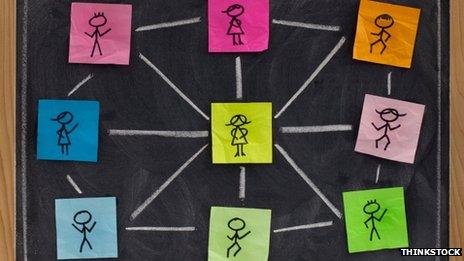Social media and the PCC elections: Tweeting candidates
- Published

Social media has been seized upon by politicians and election candidates as a way to raise awareness and reach potential voters.
Sites such as Twitter and Facebook are seen by many as an essential part of any candidate's campaign.
But with a month to go until the first elections are held for Police and Crime Commissioners (PCC) in England and Wales, what role is social media playing in the democratic process?
Viewers of TV shows as diverse as 999: What's your Emergency, X Factor and Downton Abbey are being invited to get involved in the debate about what crimes PCCs should focus on.
The hashtag #MyPCC is being promoted off the back of graphic adverts depicting drug dealers and abusive yobs.
A spokesman for the Home Office said it was the first time a government department had promoted the use of a hashtag to create debate.
He said it was generating "significant conversations" online and helping to raise awareness.
US v UK
A Home Office tweet published during Channel Four's 999: What's Your Emergency? on 8 October which asked people to look for an advert promoting the elections was retweeted 18 times.
The next day the same advert had been viewed 6,684 times on YouTube since it was uploaded on 8 October.
Journalist Charlie Beckett said that while Americans seem to have embraced social media during recent elections, the way Britons engage with sites such as Twitter is different.
Mr Beckett, founding director of POLIS, the journalism and society think-tank at the London School of Economics' Media and Communications Department, said Americans have a different relationship with the democratic process.
"In the UK there is a limit to how much people want democracy - in the States they've always elected school governors, the fire chief and the sheriff so they're used to the idea of constant campaigning and they take to social media much more effectively," he said.
"There is not the same tradition in this country but there are ways of doing it - social media won't create interest in itself, it's at its best when people are already excited."
'Dark ages'
He said a big story in the Daily Mail or an interesting edition of Question Time acted as jumping off points for people to debate an issue online.
Mr Beckett said: "The TV debates in the last elections didn't have an effect by themselves but it was as the debate was happening that journalists and others started to tweet and make judgements."
But he said the PCC elections had so far failed to grab the public's attention.
"The trouble with the PCC elections is that it isn't really making waves," he said.
But with Twitter having 10 million users in the UK and Facebook 30 million, can social networking be ignored by prospective PCCs?
Retired police officer Ray Egan is standing as an independent candidate in the West Midlands.
He has an email address which his wife monitors for him, but he does not use the internet and will not be found on any social networking sites.
"I'm still living in the dark ages, I've just heard of the phone," Mr Egan said.
"The only tweeting I listen to is the robin in my garden."
He said appearances in local newspapers, on the radio and at public meetings enabled him to publicise his campaign.
Mr Egan does not intend to join social networking sites if elected because he says he is standing as a protest vote against the concept of PCCs and if voted in intends to refuse to "take the stand".
By contrast Matt Stockdale, (@stockdalem) who is standing as an independent in Northamptonshire, said social media formed part of his campaign and he was using Facebook and Twitter to engage with potential voters.
"As yet I'm yet to go at it (social media) in earnest as so few people know about the elections," he said.
"I'm allowing the political machines to do their work to advise people... and then I'll pop up and give them an alternative.
"Twitter forms part of my campaign but I'm also going door-to-door and leafleting."
He added a negative side of Twitter was that conversations could be seen out of context and it was hard to express a point in the 140 character limit.
Sarah Russell, (@Sarah4PCC) who is standing as a PCC candidate for Labour in Leicestershire, said social media was playing a "really useful role" for engaging with voters and organisations.
"The facility to send public and private messages via Twitter has enabled me to get into all sorts of discussions and set up meetings with people easily," she said.
"It also gives people the chance to see the non-politician (normal) part of me as I tweet about all sorts of things not just the campaign.
140 characters
"Social media is one of a number of tools to engage with people - it can't be used alone but can complement more traditional means and reach a different group of people."
But she said downsides included cutting the substance of important issues by reducing them to 140 characters, being too busy to "really engage" with people and making voters who are not on Twitter feel isolated.
And it is these drawbacks which Mr Beckett said any candidate would need to be aware of if they win the vote.
He said: "You need to be careful not to confuse the range of opinion on Twitter with the wider views of the great British public."
- Published6 October 2012
- Published5 October 2012
- Published26 September 2012
- Published14 August 2012